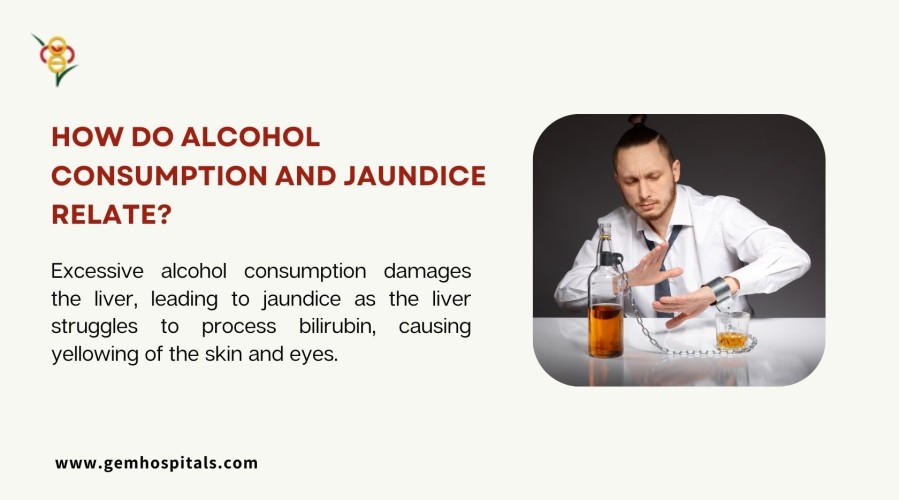Learn effective solutions for digestive problems with expert tips to improve gut health, reduce discomfort, and maintain a healthy digestive system.
How do alcohol consumption and jaundice relate?

Alcohol consumption is one of the social and cultural practices of this generation, most of them having this habit. Everyone knows that it is going to have a greater impact on the body still alcohol consumption cannot be stopped. There is a common question among alcohol drinkers which is whether it can have an impact on liver health the fact is yes. The overconsumption of alcohol will lead to liver damage, various conditions are associated with alcohol consumption, and jaundice is an indication of liver damage. While you are diagnosed with jaundice there you should stop taking alcohol because it leads to serious complications, to know more about the relationship between alcohol consumption and jaundice, keep reading the below content.
What is jaundice?
Jaundice is a condition which should be treated promptly they are characterized by yellowing of skin and eyes due to the buildup of bilirubin in the body. Bilirubin is generally eliminated by the body this yellow pigment is an end product of RBC breakdown and also it will be processed by the liver and pushed out of the body via bile. When an individual is experiencing jaundice their liver can’t process the bilirubin this is the reason why and how the bilirubin gets accumulated in the blood and leads to jaundice. It can result from a range of conditions such as hepatitis, cirrhosis, and certain types of infections, but one of the leading causes of jaundice is alcohol-induced liver disease.
How does alcohol affect the liver?
The liver plays a critical role in detoxifying harmful substances in the body, including alcohol. When an individual is consuming alcohol in that case the liver that metabolizes them with the help of enzymes converts ethanol into less harmful substances. However, excessive alcohol consumption over time can overwhelm the liver's capacity to process it, leading to liver damage. Three main types of alcohol-related liver disease can develop from prolonged alcohol abuse it includes, alcoholic fatty liver disease, alcoholic hepatitis, and cirrhosis.
The link between alcohol and jaundice
Excessive alcohol consumption can directly contribute to the development of jaundice by causing liver damage. The liver is responsible for filtering and processing bilirubin, but when it is damaged by alcohol, its ability to do so is compromised. As a result, bilirubin accumulates in the blood, leading to jaundice.
In cases of alcoholic hepatitis and cirrhosis, jaundice is a key symptom signaling advanced liver damage. It often indicates that the liver is no longer able to perform its essential functions effectively. The damage caused by alcohol is progressive, meaning that without intervention, the condition can worsen over time, potentially leading to liver failure or death.
Symptoms of alcohol-induced jaundice
Jaundice caused by alcohol-related liver disease is often accompanied by several other symptoms that indicate liver dysfunction. These include,
- Yellowing of the skin and eyes
- Dark urine
- Pale stools
- Fatigue and weakness
- Abdominal pain and swelling
- Nausea and vomiting
- Loss of appetite
- Confusion or difficulty concentrating
Health risks and complications
The development of jaundice in individuals who consume large amounts of alcohol signals significant liver dysfunction. If left untreated, it can lead to several serious complications, including, liver failure, portal hypertension, and kidney damage.
Prevention and treatment
The most effective way to prevent alcohol-induced jaundice is by moderating alcohol consumption or abstaining from alcohol altogether. For individuals who already have alcohol-related liver disease, quitting alcohol is the first step in managing the condition. Medical intervention, including medications, lifestyle changes, and in severe cases, liver transplantation, may be necessary.
Jaundice is a natural sign of liver damage when an individual is diagnosed with jaundice proper treatment is vital to avoid unexpected complications in this case alcohol consumption is a major cause of liver damage which brings about the jaundice. Here, consulting a doctor and taking proactive steps are vital because the liver is one of the vital organs of body dysfunction or cirrhosis.
For early diagnosis or preventive care, consult the specialists at Gem Hospital.
Contact us today for expert guidance and personalized treatment options!
Blogs & Article
Explore current research trends in digestive health, including new treatments, advanced diagnostics, and innovations improving gut health and patient care.
Discover common digestive health myths and the real facts. Learn simple tips to improve gut health and maintain better digestion for a healthier life.


